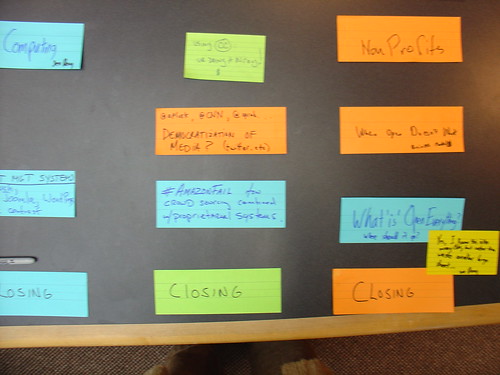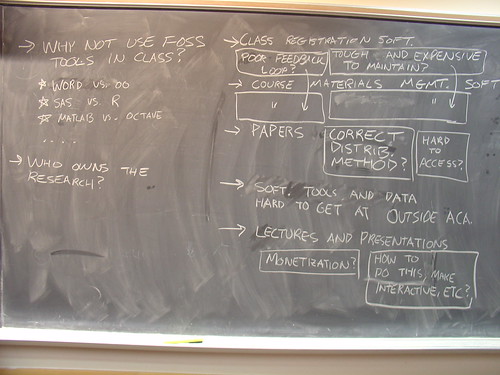Our travel experience itself was rather interesting, in mode if not saliency. We first took a train from Champaign up to Chicago. There is no train from Chicago to Madison, so we rented a Zipcar(a blue Nissan Versa) and drove to Madison. There are a number of Zipcars fairly close to Union Station in Chicago, so it was easy to walk to it.
We stayed with Alnisa Allgood, a non-profit IT specialist in the Madison area who was one of the organizers of OpenCamp. She was very hospitable and sweet to us. She treated us to brunch on Sunday at Iron Works Cafe, which was very enjoyable.
This event was associated with the Open Everything organization, which is a loose organization trying to motivate people to move toward an open society. This means, in general, transparency, freedom, sharing, choice, etc in all aspects of life. The thesis is that when society works in an open way, it works better most of the time. This movement mostly originates from the software freedom movement, and also has influences from the creative commons movement.
It wasn't a very large group, maybe 25 people attended. There were no invited speakers. It was conducted in an "unconference" style. This means we assembled topics and schedules ad hoc, once we got there. Here's what the schedule looked like:

I ran(or at least scheduled) a session on openness in academia and education. We mostly talked over openness in the software used in classes, such as Blackboard(which I am unlucky enough to use in my teaching). We also discussed openness in publication and sharing of knowledge, as well as public policy on using tax payer's money to fund proprietary solutions to public schools' information technology needs. A fellow attendee took some notes on our discussion, as well:

We also had a session on The Pirate Bay, whose founders were recently convicted of conspiracy to infringe copyright. Most of the discussions at this whole event seemed to reduce down to a discussion of what copyright policy should be, and what can people claim to own? Is immaterial property indeed "imaginary property"?
At lunch time we had a walk on State Street, which is the main commercial center on the campus. Rachel and I split off from the group(who had wandered into Chipotle) and ate at a European-style cafe. We enjoyed an Izze drink, a cup of split pea soup, and some cheese bread(referred to as a sun bun).
Douglas Whitfield and Alnisa Allgood did an excellent job facilitating the event, and I hope to continue collaboration and communication with them.
The next day Rachel and I visited Olbrich Gardens, which was a short walk from Alnisa's house, and was quite relaxing. We then drove downtown and saw a bike race going on around the capitol building, and we looked in all the little shops on State Street. A good weekend and much needed travel.

